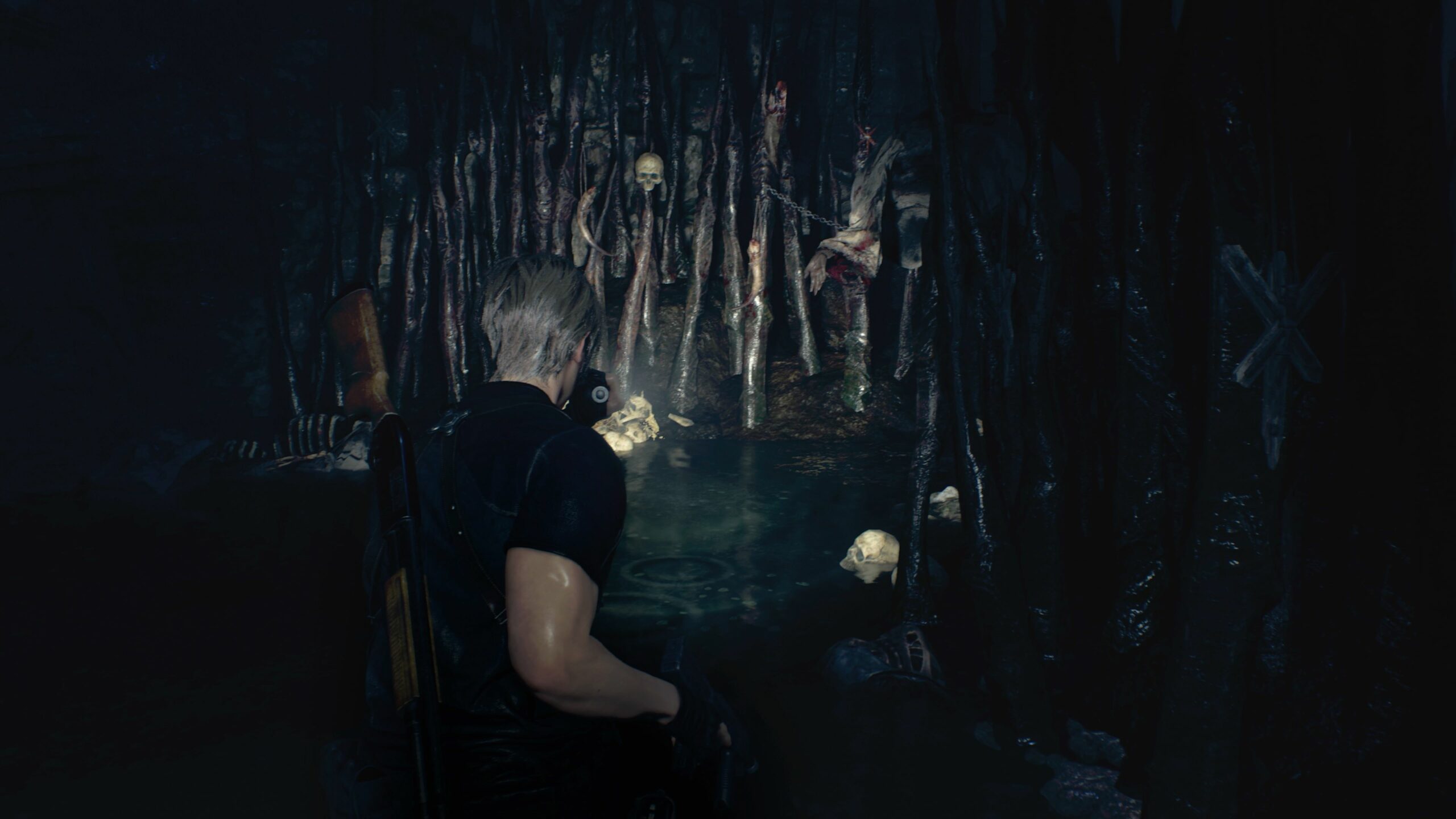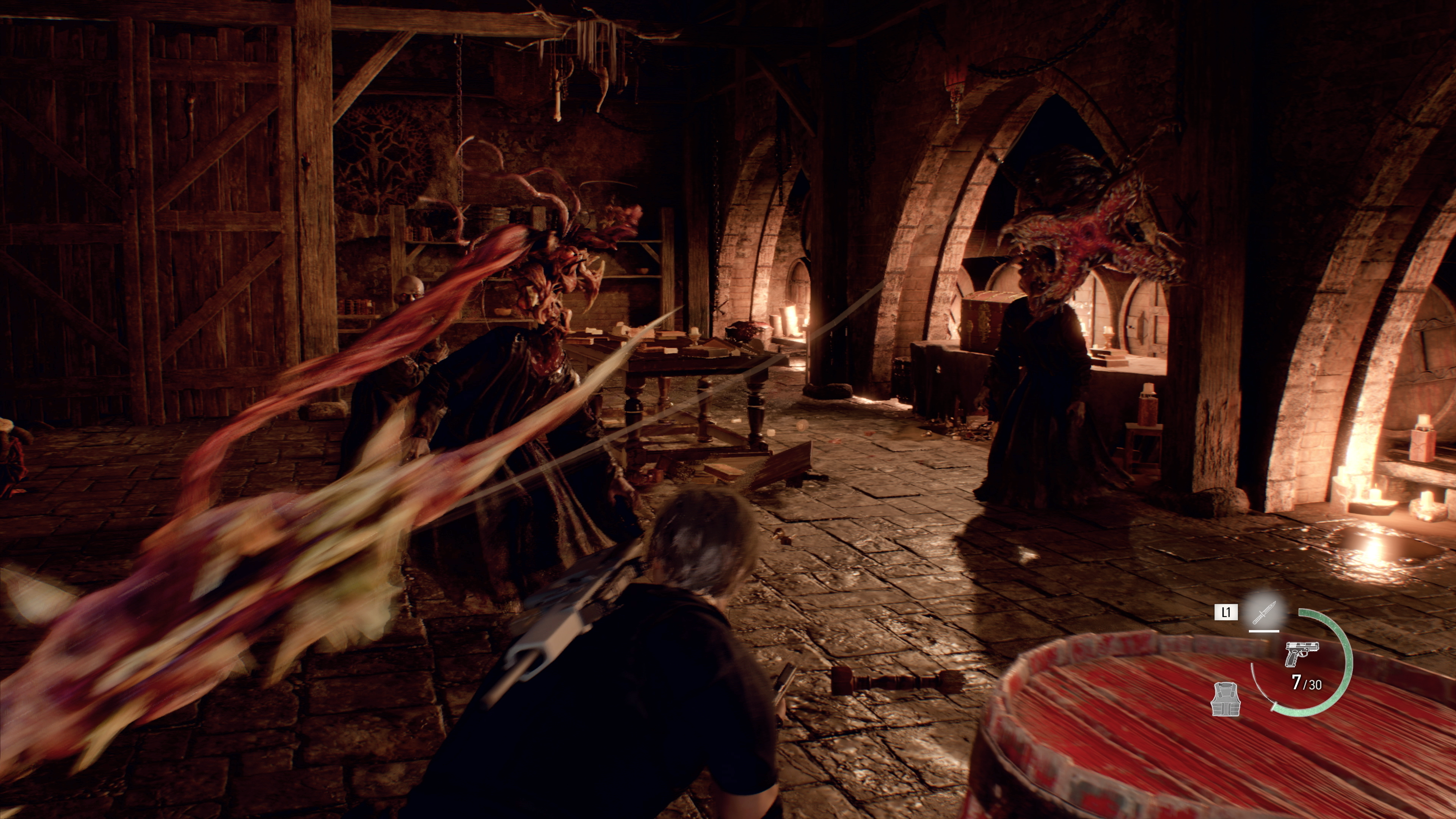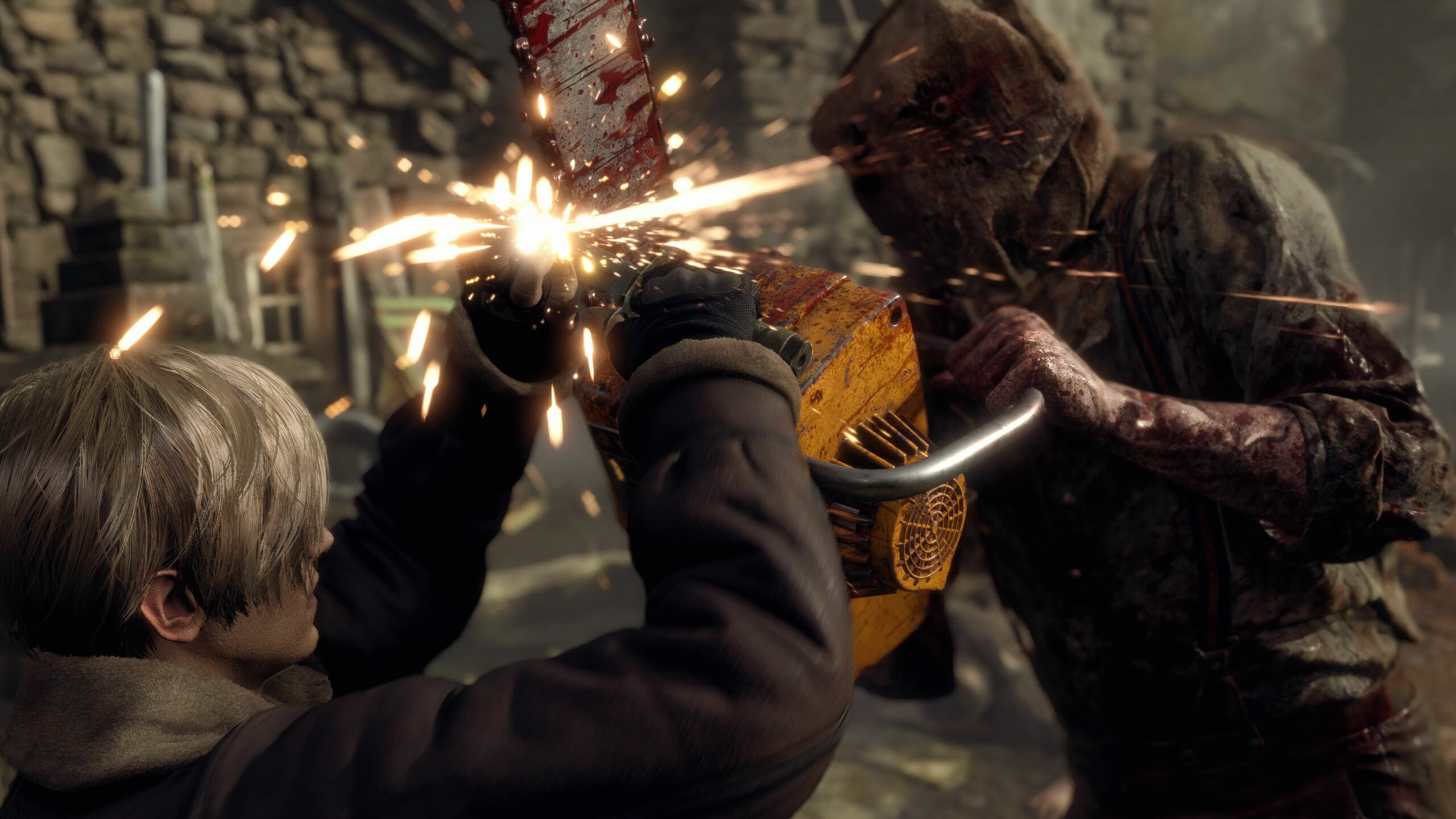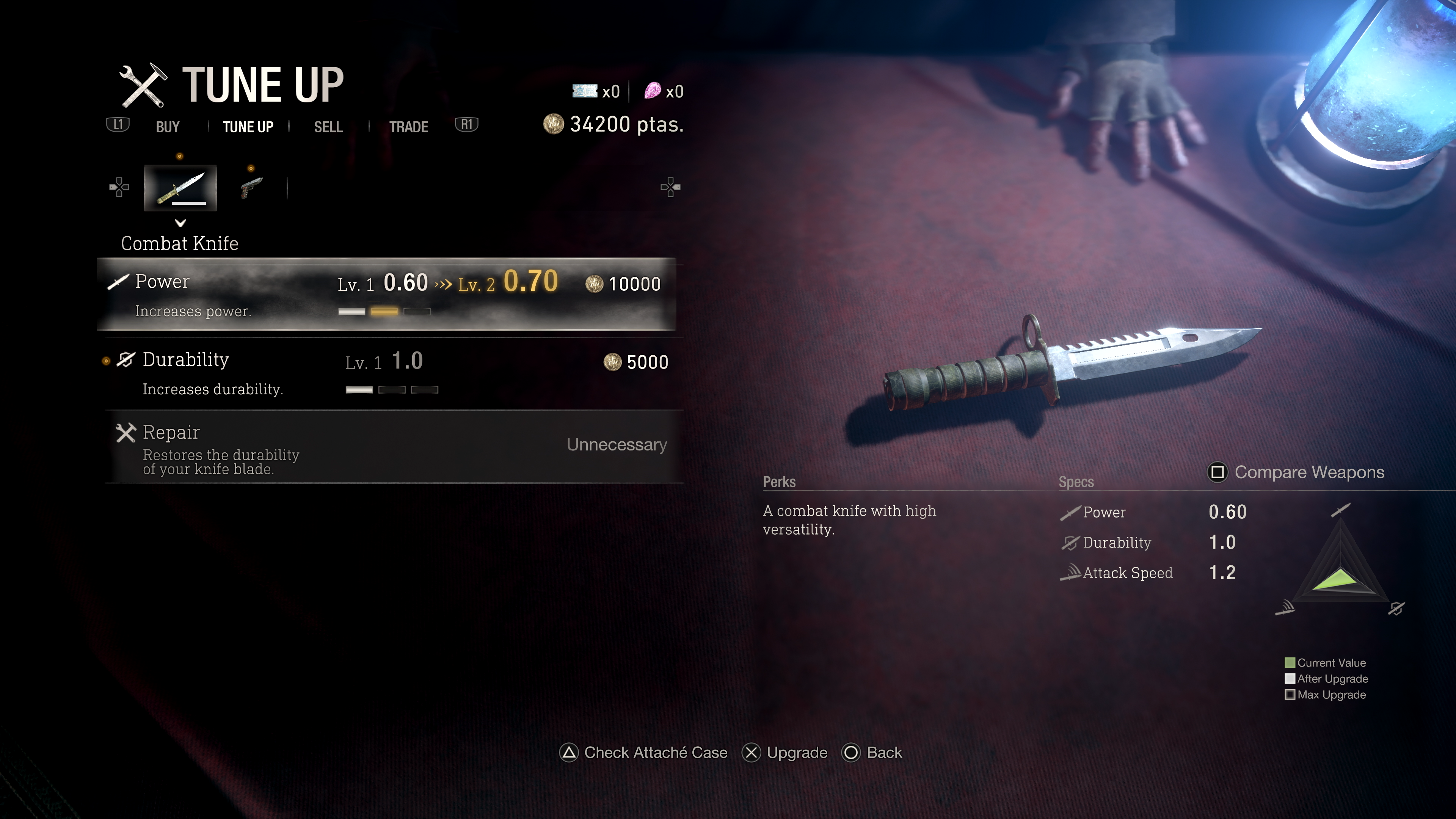Over the years, I’ve been telling myself that I’m going to replay Resident Evil 4. I first beat it around 10 years ago and was blown away by how tightly crafted and thrilling it was, but for whatever reason, I haven’t properly gone back beyond a bit of experimentation with PlayStation’s DualSense Edge controller.
Upon reflection, I think I now know why that is. Resident Evil 4 is an undeniably great game, but there’s just one problem: it’s kinda clunky. Without question, the seminal 2005 game deserves all of its flowers for how it helped pioneer the third-person shooter genre, but it can be difficult to revisit due to its control scheme. People who regularly replay the older Resident Evil games have no doubt gotten accustomed to those tank-style controls, but others, who understandably come from a modern landscape, might find the lack of mobility rather frustrating, especially when aiming. That’s certainly been the case for me.
It’s also a key reason why I’ve been on board from the start with Capcom’s 2023 remake of the game, simply titled Resident Evil 4. Using the framework of its incredible Resident Evil 2 remake, Capcom revisiting RE4 presented an opportunity to modernize the game’s more dated elements while enhancing everything that still works extremely well, from the delightfully campy tone and masterful pacing to memorably grotesque enemy design and eerie setting. It’s a monumental achievement, then, that Capcom has managed to do all of that and more with Resident Evil 4 (2023), delivering an absolute masterpiece that sets the gold standard for remakes in gaming.
That B-movie charm, and more
The core premise of the remake remains the same. After the U.S. president’s daughter is kidnapped, special agent Leon S. Kennedy is tasked with travelling to a remote European village to rescue her from a religious cult. But everything surrounding this solid action B-movie setup has been improved. Smartly, Capcom now emphasizes how Leon’s been psychologically affected since we last saw him during the harrowing events of RE2, creating a stronger throughline between the two games. This helps ground a character who, in the original game, would perform The Matrix-level superhuman feats with an almost psychopathic level of detachment. At the same time, Capcom retains some of his humour — which, in the context of his trauma, now feels more like an appropriate coping mechanism — and charming one-liners. Further strengthening the ties to RE2 is returning Leon actor Nick Apostolides, who does a brilliant job of conveying both the edgier and more lighthearted sides of the character.
The remake’s stronger writing extends to other characters, too. In the original game, the president’s daughter, Ashley, was little more than an annoying damsel in distress for Leon to save. Here, she’s far less whiny and even now has an endearing rapport with Leon, with the two bonding over the horrible experiences in which they find themselves. It also helps that Canadian actress Genevieve Buechner delivers a more understated performance, graciously making Ashley feel more like a character than a plot device. But the character who gets expanded upon the most is Luis. The ex-cop Spaniard had a relatively minor role in the original game, in which he made decidedly distasteful comments about Ashley, but here, he has a meatier role while also dropping the casual sexism. Across multiple sections of the campaign, the remake gives Leon more of an opportunity to get to know Luis, giving them a much more compelling camaraderie than ever before.
Cool moves, Mr. Kennedy
But story and characters aren’t the main reason one plays Resident Evil — that would be the survival horror gameplay. Thankfully, that’s where the remake shines even more. That all starts with Capcom’s stunning RE Engine, which powered RE2 and Village and produces more jaw-droppingly gorgeous, photorealistic visuals for RE4. Everything from blood-soaked animal carcasses and dilapidated European architecture to pus-filled, fleshy mutants and Leon’s glistening rain-soaked tactical shirt looks absolutely incredible with the contemporary visuals. Admittedly, the original RE4 marked a shift from the series’ signature scares to a more action-heavy experience, but the improved presentation — replete with expertly honed lighting and audio design (enhanced on PS5 through the disembodied, unnerving voices that emanate through the DualSense speaker) — actually helps maintain some of the horror elements.
 But let’s be real — RE4 is, first and foremost, an action game, and the remake hones in on that in all of the best ways. Honestly, it can’t be understated just how much more engaging and thrilling combat can be when you’re afforded complete 360-degree movement. Instead of occasionally fighting with the controls, you’re able to focus entirely on the obstacles in front of you, which allows Capcom to shift focus on getting creative with enemy configurations and the actual layout of areas. Sure, the original game had a level of verticality to it, but the remake’s extra freedom of movement and real-time transitions between vaulting around, climbing up ladders and jumping through windows make everything feel infinitely more seamless. Ashley, too, is less of a nuisance in combat, thanks to better AI and the ability to command her to stick close to Leon (useful when fleeing) or hang back (handy when fighting).
But let’s be real — RE4 is, first and foremost, an action game, and the remake hones in on that in all of the best ways. Honestly, it can’t be understated just how much more engaging and thrilling combat can be when you’re afforded complete 360-degree movement. Instead of occasionally fighting with the controls, you’re able to focus entirely on the obstacles in front of you, which allows Capcom to shift focus on getting creative with enemy configurations and the actual layout of areas. Sure, the original game had a level of verticality to it, but the remake’s extra freedom of movement and real-time transitions between vaulting around, climbing up ladders and jumping through windows make everything feel infinitely more seamless. Ashley, too, is less of a nuisance in combat, thanks to better AI and the ability to command her to stick close to Leon (useful when fleeing) or hang back (handy when fighting).
All the while, Leon’s returning ability to shoot enemies in the head or knee and make them vulnerable to a satisfying kick or suplex is much more intuitive and smooth when you have full camera and character control. Throw in the ability to set weapons and grenades/flashbangs to D-pad shortcuts instead of having to constantly open your inventory to equip gear and RE4 (2023) feels like the perfect realization of its predecessor’s gameplay potential.
 But the single biggest and best change in this regard comes through Leon’s knife. In the original RE4, you would have to awkwardly hold up the blade while making slow slashes, a process that had to be repeated each time you wanted to open a crate and check for resources. This, coupled with the requirement to confirm item pick-ups instead of simply automatically doing so in the remake, made things feel a bit tedious in the original. (The surprisingly addicting Tetris-style case management system does return, though, with a welcome auto-sort option, to boot.) If instant item pick-ups in the remake weren’t enough, Leon’s knife now has greater versatility in exchange for a durability metre, and it’s truly a game-changer.
But the single biggest and best change in this regard comes through Leon’s knife. In the original RE4, you would have to awkwardly hold up the blade while making slow slashes, a process that had to be repeated each time you wanted to open a crate and check for resources. This, coupled with the requirement to confirm item pick-ups instead of simply automatically doing so in the remake, made things feel a bit tedious in the original. (The surprisingly addicting Tetris-style case management system does return, though, with a welcome auto-sort option, to boot.) If instant item pick-ups in the remake weren’t enough, Leon’s knife now has greater versatility in exchange for a durability metre, and it’s truly a game-changer.
In the remake, Leon can parry most incoming attacks — including melee attacks, crossbow bolts, tendrils and even chainsaws — with a well-timed button press. The window for this is pretty generous, admittedly, but it still feels ridiculously cool to fend off incoming fire with just a knife. Instead, the challenge comes from the on-the-fly decision-making regarding when to actually employ the knife. Since it can also be used for quick, last-minute escapes when you’re grabbed by an enemy or even new insta-kill stealth moves, there’s a meaningful risk-reward element to your blade.
 At the same time, you can find new knives to replace your broken ones and repair your main blade at the Merchant (yes, the lovably goofy and mysterious salesman returns) for a fairly large fee, so there’s a perfectly balanced and rewarding gameplay loop surrounding the knife alone. That’s to say nothing of the glorious assortment of pistols, rifles, shotguns and other weapons that Leon accrues, all of which are upgradable at the Merchant. All told, Resident Evil 4 (2023)’s extensive mechanical refinements result in some of the most pulse-pounding and gratifying third-person combat I’ve ever experienced in a game.
At the same time, you can find new knives to replace your broken ones and repair your main blade at the Merchant (yes, the lovably goofy and mysterious salesman returns) for a fairly large fee, so there’s a perfectly balanced and rewarding gameplay loop surrounding the knife alone. That’s to say nothing of the glorious assortment of pistols, rifles, shotguns and other weapons that Leon accrues, all of which are upgradable at the Merchant. All told, Resident Evil 4 (2023)’s extensive mechanical refinements result in some of the most pulse-pounding and gratifying third-person combat I’ve ever experienced in a game.
Change for the better
In many ways, Resident Evil 4‘s nondescript European setting was a character unto itself, and the remake only dramatically expands upon that. Each of the game’s three main hubs — the village, castle and island — are all bigger and denser this time around, with more secrets and puzzles to tackle in each. In some areas, Leon can even return with Ashley to give her a boost and open up previously unreachable paths. While I wish they did a little more with the team-up dynamic (there aren’t really that many of these instances, and the segmented nature of RE4‘s settings means that you eventually leave areas without the ability to return), it’s still a novel way to reward exploration and add replay value. A new sidequest system also encourages you to venture off the beaten path, be it to shoot ‘x’ number of hidden targets kill more powerful versions of enemies. I appreciate the added challenge these afforded on top of just netting you valuable money and resources to spend at the Merchant’s shop.
 Throughout all of this, Capcom has also been clever enough to make changes to environments and structures where it makes sense. Gone are some of the comically over-the-top quick-time events (QTEs) — fine in 2005, but pretty dated 18 years later — and in their place are interactive sequences that retain the same campy spirit. Boss fights and setpieces that were limited to small areas now feel more lively thanks to larger combat arenas in which Leon can actually properly run around and shoot. After 2020’s Resident Evil 3, there were concerns from some long-term fans as to how much content might be cut or changed, but thankfully, this reimagining of RE4 retains nearly everything while making smart tweaks where they’re most needed.
Throughout all of this, Capcom has also been clever enough to make changes to environments and structures where it makes sense. Gone are some of the comically over-the-top quick-time events (QTEs) — fine in 2005, but pretty dated 18 years later — and in their place are interactive sequences that retain the same campy spirit. Boss fights and setpieces that were limited to small areas now feel more lively thanks to larger combat arenas in which Leon can actually properly run around and shoot. After 2020’s Resident Evil 3, there were concerns from some long-term fans as to how much content might be cut or changed, but thankfully, this reimagining of RE4 retains nearly everything while making smart tweaks where they’re most needed.
To go into specifics would spoil some of the remake’s many amazing surprises, but the best broader example I can give is the aforementioned island. What was once a numbing slog of waves of overpowered enemies and visually dull rocky environments has been reworked into a more atmospheric, tightly crafted and aesthetically diverse endgame section. What originally worked here has been thoughtfully retained and built upon — namely, the frightening Regenerators — while everything else that was grating has seen a significant revamp. Best of all, Capcom wisely fleshes out Leon’s antagonistic relationship with soldier Jack Krauser throughout the earlier sections, so the island gauntlet now serves as a dramatic and exciting build-up to an outstanding, tense, almost cat-and-mouse encounter between the two former brothers-in-arms.
The best REmake to date
 For years, many have argued that a Resident Evil 4 remake was unneeded, and that’s not without merit. The original game remains playable on pretty much every platform and holds up quite well in many ways. But Resident Evil 4 (2023) shows that such a line of thinking lacks imagination. Against all odds, Capcom has managed to take one of the most beloved games of all time and modernize in it so many brilliant ways, lovingly staying true to the original experience while bolding charting a new path for it. This is easily the greatest gaming remake to date and an early frontrunner for Game of the Year.
For years, many have argued that a Resident Evil 4 remake was unneeded, and that’s not without merit. The original game remains playable on pretty much every platform and holds up quite well in many ways. But Resident Evil 4 (2023) shows that such a line of thinking lacks imagination. Against all odds, Capcom has managed to take one of the most beloved games of all time and modernize in it so many brilliant ways, lovingly staying true to the original experience while bolding charting a new path for it. This is easily the greatest gaming remake to date and an early frontrunner for Game of the Year.
Resident Evil 4 is now available on PlayStation 4/5, Xbox Series X/S and PC.
MobileSyrup utilizes affiliate partnerships. These partnerships do not influence our editorial content, though we may earn a commission on purchases made via these links that helps fund the journalism provided free on our website.
Image credit: Capcom
